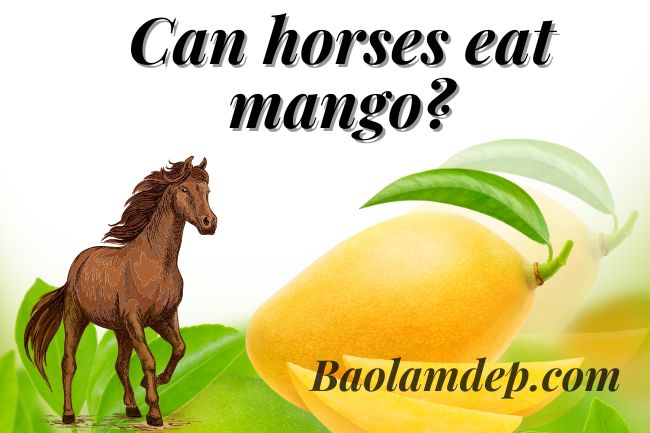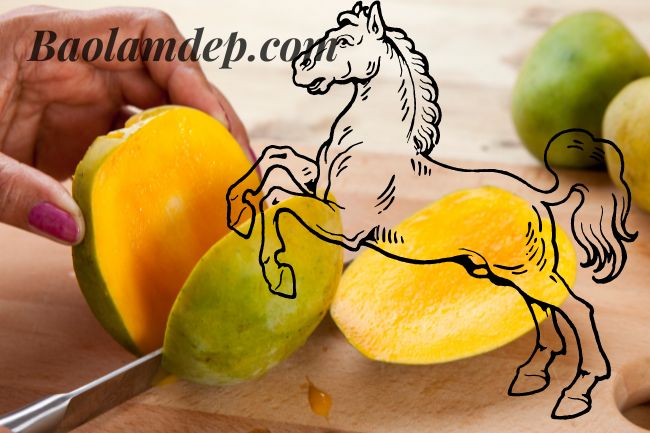Curious about whether horses can enjoy the tropical sweetness of mangoes? Discover the answer to the question “Can horses eat mango?” and explore the considerations and benefits of including mangoes in a horse’s diet. Find out more about the potential nutritional value and potential risks associated with feeding mangoes to horses.

1. Can horses eat mango?
Yes, horses can safely eat mangoes. This nutritious fruit can be a sweet treat for horses when given in moderation, and it offers health benefits thanks to its high content of vitamins A and C. However, care should be taken to remove the pit and peel before feeding it to the horse. As always, any changes to a horse’s diet should be made gradually and under a veterinarian’s guidance.
2. The Nutritional Value of Mangoes for Horses
Mangoes are a rich source of essential nutrients that can contribute positively to a horse’s health. Here’s a closer look at the nutritional composition of mangoes:
- Vitamins: Mangoes are packed with vitamins A and C. Vitamin A is crucial for maintaining healthy skin, vision, and immune function in horses. On the other hand, Vitamin C is a potent antioxidant that can help combat oxidative stress in the horse’s body.
- Dietary Fiber: Mangoes contain a good amount of dietary fiber, which is beneficial for a horse’s digestive system. It helps promote healthy gut function and can aid in preventing constipation and colic.
- Water Content: Mangoes have high water content, which can contribute to keeping a horse well-hydrated, especially during hot summer months.
- Other Nutrients: Mangoes also contain other nutrients like potassium and magnesium, both of which play an important role in maintaining a horse’s overall health. Potassium is crucial for the proper functioning of muscles, nerves, and enzymes, while magnesium is involved in numerous biochemical reactions in the horse’s body, including energy production and muscle function.
It’s important to note that while mangoes offer these nutrients, they should not replace the staples of a horse’s diet – namely, hay or grass. Instead, think of mangoes as an occasional treat or supplement. As always, consult with a veterinarian before making significant changes to your horse’s diet.
3. Risks and Precautions When Feeding Mangoes to Horses
Feeding mangoes to horses is generally safe, but like with any food outside of their regular diet, there are some risks and precautions to be aware of:
- Choking Hazard: The pit (seed) of the mango is quite large and can pose a choking risk for horses. Always remove the pit before feeding the fruit to your horse.
- Digestive Issues: Although horses can digest fruit, the skin of the mango can be hard for some horses to digest. Therefore, it’s advisable to peel the mango before feeding it to your horse.
- Sugar Content: Mangoes, like many fruits, have a high sugar content. While this isn’t typically a problem in small amounts, horses that are insulin resistant or prone to conditions like laminitis should have their fruit intake closely monitored.
- Allergic Reactions: Although rare, some horses could potentially have an allergic reaction to mangoes. Always monitor your horse for signs of an allergic reaction, such as hives, difficulty breathing, or swelling around the mouth or throat.
- Moderation is Key: Mangoes should be considered a treat, and like all treats, they should be given in moderation. Too much of any one type of food can upset a horse’s digestive system and potentially lead to serious health issues.
Remember, whenever you introduce a new food to your horse’s diet, it should be done gradually. Always consult with your vet first, and monitor your horse closely for any changes in behavior or health.

4. How to Feed Mango to Horses?
When feeding mangoes to horses, it’s important to follow these guidelines:
- Preparation: Start by washing the mango thoroughly to remove any dirt or residue. Remove the skin using a knife, as the skin can be tough and difficult for horses to chew and digest. Also, remove the pit or seed, as it can pose a choking hazard.
- Cutting: Cut the mango into small, bite-sized pieces. This makes it easier for the horse to chew and swallow. Avoid feeding large chunks that may be difficult for the horse to handle.
- Moderation: Mangoes should be fed to horses as an occasional treat rather than a regular part of their diet. Limit the amount of mango given, as excessive consumption may lead to digestive upset or weight gain.
- Introduce gradually: If it’s the horse’s first time eating mangoes, introduce them slowly and in small quantities. Monitor the horse for any signs of allergic reactions or digestive issues.
- Monitor the horse: Observe how the horse responds to eating mangoes. If there are any adverse reactions, such as diarrhea, colic, or signs of allergies (such as hives or difficulty breathing), discontinue feeding mangoes and consult a veterinarian.
Remember, every horse is unique, and their dietary needs may vary. It’s essential to consider their overall health, existing diet, and any specific conditions they may have. If you have any concerns or questions, consult with a veterinarian or equine nutritionist for personalized advice.
5. Expert Opinions on Horses Eating Mangoes
- Views from Veterinarians and Equine Nutritionists: Many veterinarians and equine nutritionists agree that feeding mangoes to horses can be done safely, given some considerations. They emphasize the importance of removing the pit and peeling the fruit, as well as feeding mangoes in moderation due to their high sugar content. For horses with certain health conditions, such as insulin resistance or laminitis, they suggest monitoring the horse’s response closely or avoiding high-sugar fruits altogether.
- Real-Life Experiences from Horse Owners: Many horse owners have found that their horses enjoy the sweet taste of mangoes and have had no issues when feeding this fruit as an occasional treat. However, others have noted that some horses can be picky eaters and may not like the taste or texture of mangoes.
- General Consensus: As with any changes in diet, horse owners should introduce new foods gradually and observe their horse for any changes in behavior, appetite, or health. When introducing mangoes, start with small pieces and monitor the horse’s reaction.
Please note, while this section gives an overview of general opinions, it’s always best to consult with a professional veterinarian or equine nutritionist regarding your horse’s specific needs and health condition.
6. Alternative Fruits Safe for Horses
While mangoes can be a healthy treat for horses, there are several other fruits that are also safe for them to consume. Here are some alternative fruits that horses can enjoy:
- Apples: Rich in vitamins and fiber, apples are a popular choice for horses. Ensure to remove the seeds and core before feeding.
- Bananas: High in potassium and easily digestible, bananas make a nutritious snack for horses. Remove the peel and cut into small pieces.
- Carrots: Crunchy and packed with vitamins, carrots are a favorite among horses. They provide a good source of beta-carotene and can be given as whole or grated.
- Watermelon: A hydrating treat, watermelon is safe for horses. Remove the seeds and rind and cut the fruit into small, manageable pieces.
- Strawberries: Sweet and nutritious, strawberries can be fed to horses in moderation. Remove the stems and slice them into smaller portions.
When comparing these fruits to mangoes, each fruit offers its own unique nutritional profile. Some fruits may be higher in certain vitamins or minerals, while others may have a different taste or texture. It’s important to note that while fruits can provide valuable nutrients, they should still be given as occasional treats and not as a primary source of nutrition for horses.
7. FAQs About Horses and Mango
- How should mangoes be prepared for horses?
Before feeding mangoes to horses, it is important to remove the skin and pit. Cut the mango into small, bite-sized pieces to make it easier for the horse to chew and digest.
- Can horses eat mango skin?
It is best to remove the mango skin before feeding it to horses. The skin can be tough and difficult for horses to chew and digest.
- Should mangoes be given as a regular part of a horse’s diet?
Mangoes should be considered as an occasional treat rather than a regular part of a horse’s diet. While they offer nutritional benefits, they should not replace the horse’s primary diet of hay, grass, and balanced horse feed.
- Are there any risks or concerns associated with feeding mangoes to horses?
Some horses may have sensitivities or allergies to mangoes. It is recommended to introduce mangoes gradually and observe for any adverse reactions such as digestive upset or allergic symptoms. If any concerns arise, consult with a veterinarian.
In conclusion, mangoes can be a tasty and nutritious treat for horses when fed in moderation. However, it’s important to consider an individual horse’s needs and monitor for any adverse reactions. We hope the article “can horses eat mango” on Báo Làm Đẹp provides you with valuable information.